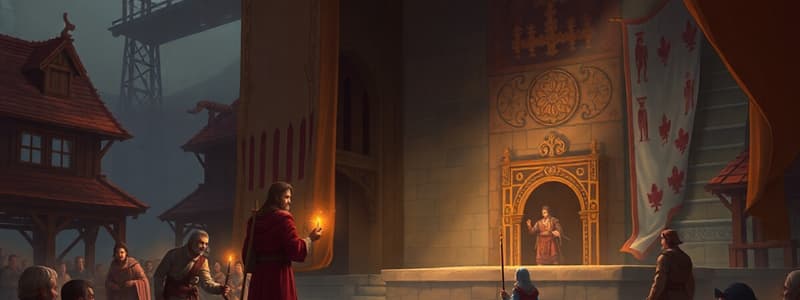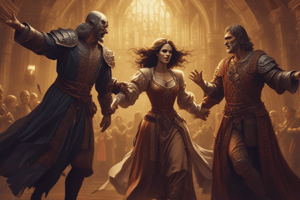Podcast
Questions and Answers
What was the primary purpose of the trope introduced by the Church during Mass?
What was the primary purpose of the trope introduced by the Church during Mass?
- To teach Latin to the illiterate
- To ridicule the clergy
- To create entertainment for the congregation
- To provide a dramatized scene for understanding the service (correct)
The most famous Morality play is titled 'Everyman'.
The most famous Morality play is titled 'Everyman'.
True (A)
What were the three distinct types of plays presented on the mansions?
What were the three distinct types of plays presented on the mansions?
Mystery plays, Miracle Plays, Morality plays
The Church's introduction of the __________ helped to make the service understandable for the congregation.
The Church's introduction of the __________ helped to make the service understandable for the congregation.
Match the type of play with its description:
Match the type of play with its description:
Why were the plays moved outside to marketplaces in the 13th and 14th centuries?
Why were the plays moved outside to marketplaces in the 13th and 14th centuries?
Hrosvitha was a monk who wrote several religious comedies performed on mansions.
Hrosvitha was a monk who wrote several religious comedies performed on mansions.
The platform used for separate scenes in cathedrals was called a __________.
The platform used for separate scenes in cathedrals was called a __________.
What period is referred to as the Early Middle Ages?
What period is referred to as the Early Middle Ages?
The Feudal System allowed peasants to own large tracts of land.
The Feudal System allowed peasants to own large tracts of land.
What were the primary forms of dramatic performance during the Early Middle Ages?
What were the primary forms of dramatic performance during the Early Middle Ages?
The period known as the _____ Ages is often referred to as the Dark Ages.
The period known as the _____ Ages is often referred to as the Dark Ages.
Which of the following statements is true about the perception of the Early Middle Ages?
Which of the following statements is true about the perception of the Early Middle Ages?
The Medieval Church always supported theatrical performances.
The Medieval Church always supported theatrical performances.
What type of production often attempted to out-perform others by becoming more spectacular?
What type of production often attempted to out-perform others by becoming more spectacular?
The performers in the Passion Play at Oberammergau vowed to perform only if their village was saved from the Black Plague.
The performers in the Passion Play at Oberammergau vowed to perform only if their village was saved from the Black Plague.
Match the terms with their definitions:
Match the terms with their definitions:
What were pageant wagons used for in Medieval Theatre?
What were pageant wagons used for in Medieval Theatre?
The main opportunity for leisure and entertainment for the lower classes in the Medieval Period was through _____ services, holidays, and festivals.
The main opportunity for leisure and entertainment for the lower classes in the Medieval Period was through _____ services, holidays, and festivals.
The Passion Play shows scenes from Christ's life, particularly his last days of _____ and his resurrection.
The Passion Play shows scenes from Christ's life, particularly his last days of _____ and his resurrection.
Match the following terms with their descriptions:
Match the following terms with their descriptions:
Why were some towns arranged with heaven at one end and hell at the other during performances?
Why were some towns arranged with heaven at one end and hell at the other during performances?
The first performance of the Oberammergau Passion Play occurred in the year _____ after the villagers were saved from the plague.
The first performance of the Oberammergau Passion Play occurred in the year _____ after the villagers were saved from the plague.
Pageant wagons were primarily used in England, France, and Germany.
Pageant wagons were primarily used in England, France, and Germany.
Flashcards
Middle Ages
Middle Ages
The period in European history following the fall of the Roman Empire, lasting from roughly 475 A.D. until 1300 or 1500 A.D.
Dark Ages
Dark Ages
A misleading term sometimes used to refer to the Early Middle Ages, characterized by a perception of cultural decline following the Roman Empire.
Feudal System
Feudal System
A social system in Medieval Europe where nobles owned land and peasants worked it in exchange for protection and the right to live there.
Peasants
Peasants
Signup and view all the flashcards
Medieval Church
Medieval Church
Signup and view all the flashcards
Medieval Entertainment
Medieval Entertainment
Signup and view all the flashcards
Folk Festivals, Jugglers, and Minstrels
Folk Festivals, Jugglers, and Minstrels
Signup and view all the flashcards
Late Middle Ages
Late Middle Ages
Signup and view all the flashcards
What are tropes?
What are tropes?
Signup and view all the flashcards
What are mystery plays?
What are mystery plays?
Signup and view all the flashcards
What are miracle plays?
What are miracle plays?
Signup and view all the flashcards
What are morality plays?
What are morality plays?
Signup and view all the flashcards
What is 'Everyman'?
What is 'Everyman'?
Signup and view all the flashcards
What are mansions?
What are mansions?
Signup and view all the flashcards
What is Hell's Mouth?
What is Hell's Mouth?
Signup and view all the flashcards
What are guilds?
What are guilds?
Signup and view all the flashcards
Medieval Theatre Production
Medieval Theatre Production
Signup and view all the flashcards
Pageant Wagon
Pageant Wagon
Signup and view all the flashcards
Pageant Wagon - Lower Level
Pageant Wagon - Lower Level
Signup and view all the flashcards
Pageant Wagon - Upper Level
Pageant Wagon - Upper Level
Signup and view all the flashcards
Pageant Wagon - Performance Location
Pageant Wagon - Performance Location
Signup and view all the flashcards
Pageant Wagon - Cycle Plays
Pageant Wagon - Cycle Plays
Signup and view all the flashcards
Passion Play
Passion Play
Signup and view all the flashcards
Oberammergau Passion Play
Oberammergau Passion Play
Signup and view all the flashcards
Study Notes
Medieval Theatre
- The Middle Ages, also called the Medieval Period, spanned from the fall of the Roman Empire (475 AD) to roughly 1300 or 1500 AD.
- Early Middle Ages, sometimes called the Dark Ages, saw a loss of Greco-Roman culture and social instability. It's inaccurate to say this period had no cultural value.
- Feudalism was a key aspect of Medieval society, with nobility and the Church owning land and the majority of the population (peasants) working it. Peasants were expected to give a portion of their harvest to their lord in exchange for the right to live on the land. Conditions for peasants were difficult, with little chance for upward mobility or education.
- Religious services, holidays, and festivals provided the only significant opportunity for leisure and entertainment for the lower classes.
- The church had mixed feelings about drama; sometimes banning or discouraging it, contributing to the lack of written plays and theatrical performances in the Early Middle Ages. Folk festivals, jugglers, and wandering minstrels were more common forms of entertainment.
- Church leaders sometimes viewed drama with suspicion.
Resurrection of Theatre
- While the Church was sometimes opposed to drama, it played a role in its resurrection.
- Masses were said in Latin, but the congregation did not understand this language.
- Tropes, short dramatized scenes, were introduced to help the illiterate understand the service.
- Tropes spread and developed into dialogue and were presented in local languages.
- These scenes became the basis for many religious plays.
Types of Medieval Plays
- Mystery plays - depicted stories from the Bible
- Miracle plays - highlighted the lives of saints
- Morality plays - illustrated moral lessons and right vs. wrong, a notable example is Everyman.
Development of Plays
- As drama became more popular, it moved from churches to public spaces like market squares,
- Guilds (unions of workers) became sponsors of plays, providing skilled labor and resources to increase the quality of the productions.
- Trade-based guilds (blacksmiths, carpenters, cooks) were particularly active in this development, with their skills presented in the drama.
Staging and Performance
- Early plays presented episodes in a particular sequence; heaven and hell were on opposite ends of the performance area and other scenes filled the spaces in between.
- Pageant wagons (double-decked wagons), were employed by the English, French, and Dutch. These wagons moved in a procession, presenting the plays' parts episode by episode to the audience who gathered in front and around the wagons, somewhat like modern parades.
- The Cycle Plays were a sequence of plays, like scenes in a parade.
- Passion Plays: This type of play depicted the last days of Jesus's life. The Oberammergau Passion Play is performed every ten years (after a gap in WWII).
Cycle Plays and Modern Parallels
- Modern TV series share common features with Cycle Plays.
Studying That Suits You
Use AI to generate personalized quizzes and flashcards to suit your learning preferences.




